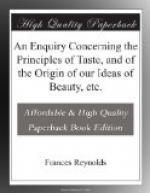In the progress of civilization, the polishing principle, which I call taste, is chiefly found in the highest sphere of life, highest both for internal and external advantages, wealth accelerates the last degree of cultivation, by giving efficacy to the principles of true honour; but it also accelerates its corruption, by giving efficacy to the principles of false honour, by which the true loses its distinction, becomes less and less apparent, nay, by degrees, less and less real. Wealth becoming the object of honour, every principle of true taste must be reversed. Hence the dire polish of the obdurate heart, repelling the force of nature. Hence avarice and profusion, dissipation, luxurious banqueting, &c. supersede the love of oeconomy, domestic comfort, the sweet reciprocation of the natural affections, &c. &c. Hence the greatest evils of society: the sorrows of the virtuous poor, the spurns that patient merit of the unworthy takes, in a word, the general corruption of morals, and, of course, of true taste!
The vulgar, who are strangers to the internal principles of honour, always annex their ideas of taste to the external appearances of the highest rank of life, which being easily acquired, particularly that of dress, the prevalency of modes and fashions, however absurd, is universally adopted. Those of false taste adopt them to attract notice; those of true taste, to avoid it. But, at this present, the difficulty of avoiding singularity in dress is, I imagine, much to be lamented by women of taste and virtue, the prevailing mode of feminine attire being diametrically opposite to every principle of feminine excellence; a melancholy proof of our being arrived at the last stage of depravity!
I could expatiate largely on this subject, but it would be inconsistent with my plan, which the reader may perceive, throughout the whole work, to be a mere outline only.
The three grand co-existing principles of taste, virtue, honour, and ornament, run through all its perceptions. Their triple union cannot be broken; but taste is nominally distinguished by the one or the other, according as its objects, situations, circumstances, &c. vary. Ornament and honour seem the public character of taste; virtue to be the private and domestic, where, though unperceived by the vulgar, to the eye of taste[A] she appears in her highest ornament, highest honour.
[Footnote A: Truth can only judge itself. BACON.]
Taste seems to comprize three orders or degrees in its universal comprehension.
The first is composed of those objects which immediately relate to the divinity, among which man claims the preeminence, when viewed in his highest character: witness the inexpressible charm which the natural virtuous affections of the soul inspire, when moved by some strong impulse, such as parental tenderness, filial piety, friendship, &c. &c. &c. Do they not unite the moral sentiment to the divine?




